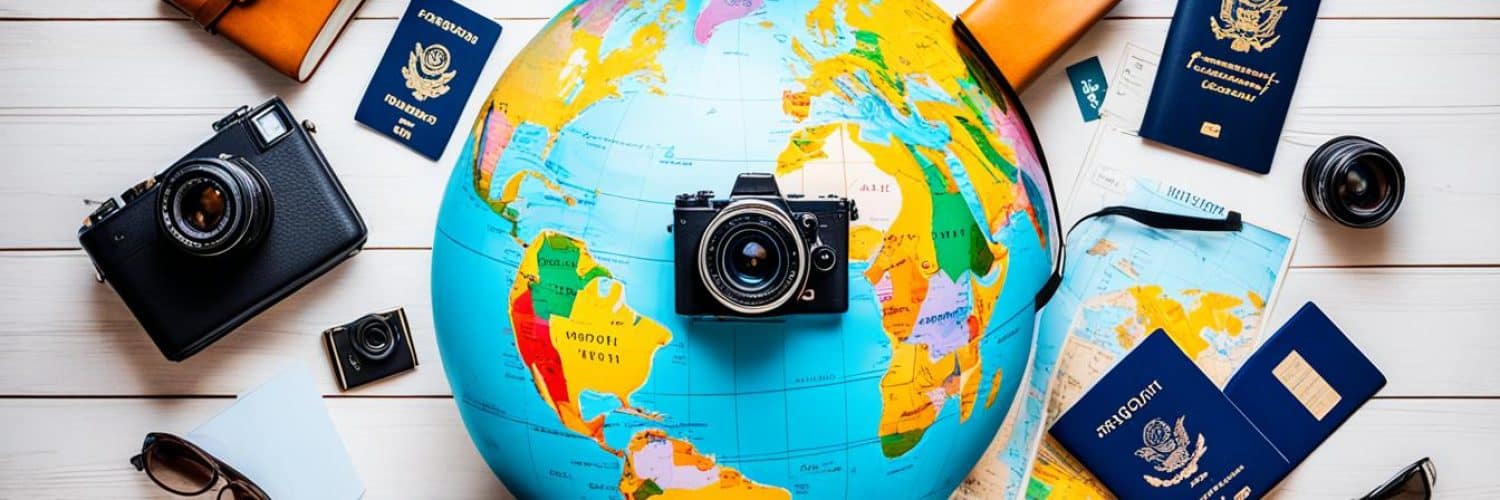Our comprehensive guide is designed to equip you with the essential tips and advice for embracing expat life to the fullest. From navigating legal requirements to building a support network, managing homesickness to seizing career opportunities, we’ve got you covered. Prepare to embark on a transformative journey of personal growth, cultural adaptation, and unforgettable memories.
Key Takeaways:
- Expatriate life offers incredible personal and professional growth opportunities.
- Selecting the right destination is crucial for a successful expat experience.
- Developing adaptability and resilience are vital traits for thriving abroad.
- A support network is essential for expats to overcome challenges and feel connected.
- Managing homesickness and practicing self-care contribute to emotional well-being.
What is an Expat?
An expat, or expatriate, is someone who lives temporarily or permanently in a country other than their country of citizenship. This includes individuals who travel for a few months or those who have been living abroad for several years. The term is often used to describe people who have chosen to relocate to experience a new culture or who seek career opportunities in a different country.
Expats are adventurous individuals who embrace the challenges and rewards of living abroad. They thrive in unfamiliar environments, immerse themselves in diverse cultures, and broaden their horizons through unique life experiences.
âLiving abroad is an opportunity to break free from the familiar and step into a world of excitement and growth.â
An expat’s journey entails navigating a new lifestyle, adapting to cultural differences, and building a supportive network in the host country. It requires resilience, open-mindedness, and a willingness to step outside of comfort zones.
The Challenges and Rewards of Being an Expat
Living abroad as an expat comes with its unique set of challenges and rewards. From adapting to a new culture to overcoming language barriers and navigating social etiquette, expat life can present various hurdles. Practical challenges like finding housing and dealing with bureaucracy can also add to the initial difficulties.
However, the rewards of expat life far outweigh the challenges. One of the most significant rewards is the opportunity for personal and professional growth. Living abroad exposes individuals to new experiences, perspectives, and ways of thinking, fostering personal development and enhancing one’s adaptability and resilience.
Moreover, being an expat provides the chance to engage with people from diverse backgrounds and cultures. Building connections with individuals from different walks of life not only broadens one’s horizons but also enriches their understanding and appreciation of cultural differences.
Another rewarding aspect of expat life is the joy of discovering new cultures. Exploring the local traditions, cuisine, and landmarks can be a source of constant adventure and excitement. Each day presents an opportunity to delve deeper into the local culture and form lasting memories.
“Living abroad allows us to step out of our comfort zones, challenge ourselves, and grow into more accepting and open-minded individuals.”
The Challenges of Being an Expat
Being an expat presents several challenges, some of which may include:
- Adapting to a new culture and customs
- Overcoming language barriers
- Navigating social etiquette and norms
- Finding suitable housing in a foreign environment
- Dealing with bureaucratic processes and paperwork
The Rewards of Expat Life
The rewards of being an expat are abundant and include:
- Personal and professional growth
- Diverse connections and friendships
- Opportunities for cultural immersion and exploration
- Expanded worldview and perspective
- Increased adaptability and resilience
| Challenges of Being an Expat | Rewards of Expat Life |
|---|---|
| Adapting to a new culture | Personal and professional growth |
| Overcoming language barriers | Diverse connections and friendships |
| Navigating social etiquette | Opportunities for cultural immersion |
| Finding suitable housing | Expanded worldview and perspective |
| Dealing with bureaucracy | Increased adaptability and resilience |
Developing Adaptability and Resilience as an Expat
As an expat, one of the most crucial skills to cultivate is adaptability. Being open to new experiences, adjusting to different cultural norms, and embracing flexibility are key traits for successful expat living. It is the ability to navigate unfamiliar territory and thrive in diverse environments that allows expats to truly make the most of their international adventure.
When living abroad, expats often face various challenges that require resilience and determination to overcome. From language barriers to social customs, every aspect of expat life brings unique hurdles. However, by developing resilience, expats can proactively tackle these challenges and turn them into opportunities for growth.
“The only way to make sense out of change is to plunge into it, move with it, and join the dance.” – Alan Watts
Resilience allows expats to bounce back from setbacks, adapt to new situations, and find creative solutions to unfamiliar problems. It helps overcome the emotional challenges that expats may face, such as homesickness and culture shock. By building resilience, expats cultivate a positive mindset and develop the ability to thrive in the face of adversity.
Cultivating Adaptability:
- Embrace the unknown: Embrace new experiences with an open mind, curiosity, and a willingness to learn.
- Learn the local language: Language skills can open doors to deeper cultural immersion and enhance communication.
- Be flexible: Adapt your expectations and approaches to align with the cultural norms of your host country.
- Seek support: Connect with other expats, join social groups or forums, and share experiences to enhance your adaptability.
Building Resilience:
- Practice self-care: Prioritize your physical, emotional, and mental well-being to maintain a strong foundation.
- Develop coping strategies: Identify healthy coping mechanisms, such as meditation, exercise, or journaling, to navigate challenges.
- Seek support networks: Build a support system of like-minded individuals who understand the expat experience.
- Stay positive: Cultivate a positive mindset by focusing on personal growth and embracing the opportunities that come with expat life.
Developing adaptability and resilience as an expat is an ongoing journey. It requires a willingness to step out of your comfort zone, embrace challenges, and cultivate a mindset of growth and opportunity. By honing these skills, expats can overcome obstacles, make the most of their international experience, and thrive in their new home.
Choosing the Right Destination
As you embark on your expat journey, choosing the right destination is a crucial decision that can greatly impact your overall experience. To ensure a successful transition, it’s important to consider several key factors when selecting your new home.
Language Compatibility
One of the first things to consider is the language spoken in your potential expat destination. Assess your proficiency in the local language and determine if language barriers may pose challenges or hinder your ability to navigate daily life. Opting for a country where you are already familiar with the language or investing time and effort into learning the local language can greatly enhance your expat experience.
Cost of Living
Researching the cost of living in your potential destination is crucial for financial planning. Consider factors such as housing, groceries, transportation, healthcare, and entertainment. Use cost of living calculators to compare expenses between different countries, ensuring your budget aligns with the local standards.
Job Market and Career Opportunities
If you are planning to work abroad, evaluate the job market in your potential destination. Research industries that align with your skills and qualifications. Explore job portals to gain insights into available opportunities and potential salary ranges. Prioritizing countries with a robust job market in your field of expertise will increase your chances of finding meaningful employment.
Safety
Ensure the safety and security of your chosen destination by researching crime rates, political stability, and healthcare standards. Government-issued safety reports and global peace indexes can provide valuable insights into the overall safety level of a country. Prioritizing your well-being is essential for a positive expat experience.
Cultural Fit
Consider the cultural fit between your own values and the host country’s traditions and customs. Assess whether you would feel comfortable and accepted within the local community. Understanding and appreciating the host country’s culture will help you adapt more easily and build positive relationships with locals.
Research Tools
Utilize various resources to aid in your decision-making process. Expat forums and online communities allow you to connect with individuals who have firsthand experience in your potential destination. Cultural assessment tools can provide insights into the compatibility of your values with the host country’s cultural norms. Consult expat associations and embassies for official information and guidance.
“Choosing the right destination is like laying the foundation for a successful expat journey. By considering language compatibility, cost of living, job market, safety, and cultural fit, you can ensure a smooth transition and create a fulfilling expat experience.”
Remember, every expat’s journey is unique, and what works for someone else might not be the best fit for you. Take your time, conduct thorough research, and trust your instincts when making this crucial decision. By choosing a destination that aligns with your priorities and preferences, you’ll set the stage for an incredible adventure as an expat.
Navigating the Legal Requirements
Moving abroad as an expat requires complying with the legal requirements of the host country. To ensure a smooth transition and abide by the immigration laws, it is essential to understand the expat legal requirements specific to your destination. These requirements typically include obtaining the appropriate visas and permits based on the purpose of your stay. Some common visa types include:
- Tourist visas: For short-term visits or holidays
- Work permits: For employment or business purposes
- Business visas: For individuals engaging in business activities
- Student visas: For pursuing studies or educational programs
- Residency visas: For long-term stays or permanent residency
Each country has its own criteria and application processes for these visas and permits. It is imperative to research and understand the specific requirements and procedures to ensure compliance. Consulting with immigration experts or legal professionals can provide valuable guidance and assistance in navigating the legal complexities.
One helpful resource for expat legal requirements is the official website of the destination country’s immigration department or embassy. These websites often provide comprehensive information on visa types, application procedures, required documents, fees, and processing times. It is crucial to thoroughly review the official guidelines and follow them meticulously to avoid any legal complications or delays.
Additionally, consider seeking advice from expat communities or online forums where individuals share their experiences and insights on the legal aspects of living abroad. Connecting with fellow expats who have gone through the visa application process can provide practical tips and firsthand knowledge to help you navigate the legal requirements more effectively.
Remember, compliance with the expat legal requirements is crucial to ensure a smooth transition and a successful expat journey. Research, preparation, and seeking professional advice can help you navigate the visa and permit application processes with confidence.
By understanding the necessary visas and permits, being aware of the specific criteria, and adhering to the application processes, you can fulfill the legal obligations and enjoy your expat experience without unnecessary stress.
Financial Considerations for Expats
When embarking on the journey of becoming an expat, it is crucial to consider the financial aspects of your new life abroad. Proper financial planning and budgeting can help ensure a smooth transition and provide security throughout your expat experience.
Relocation Costs
Moving to a new country often involves various expenses that you need to account for. These relocation costs can include visa fees, transportation fees, shipping costs for your belongings, and initial setup expenses such as renting a new home or purchasing furniture. By estimating these costs in advance, you can plan your finances accordingly and avoid any financial surprises.
Living Expenses
Living expenses in your new country may differ significantly from what you were accustomed to in your home country. It’s important to research and understand the cost of living in your expat destination, including accommodation, groceries, utilities, transportation, healthcare, and leisure activities. Creating a budget that reflects these expenses will help you manage your finances effectively and make informed financial decisions.
Emergency Funds
No matter how well you plan, unexpected expenses can arise. It’s essential to set aside emergency funds to handle any unforeseen circumstances or financial emergencies. Maintaining a separate account specifically designated for emergencies will provide you with the peace of mind and financial stability needed to navigate any unexpected challenges that may arise during your expat journey.
Currency Exchange
If you are relocating to a country with a different currency, it’s important to consider the implications of currency exchange rates on your finances. Fluctuations in currency exchange rates can impact the value of your income, savings, and expenses. Stay informed about exchange rate trends and consider strategies such as hedging or using currency exchange services to manage any potential risks.
Local Bank Accounts and Money Transfers
Opening a local bank account in your new country can simplify your financial transactions and help you avoid unnecessary fees associated with international transfers and currency conversions. It’s advisable to research local banks, their services, and any requirements for opening an account. Additionally, explore reliable and cost-effective options for transferring money between your home country and your new country to ensure convenient and secure financial transactions.
By considering these financial considerations for expats, you can lay a strong foundation for your financial well-being and ensure a smooth transition into your new life abroad. It’s essential to prioritize financial planning, budgeting, and setting aside emergency funds to provide you with the financial security and peace of mind needed to fully enjoy your expat experience.

| Expenses | Costs |
|---|---|
| Visa fees | $500 |
| Transportation fees | $1,000 |
| Shipping costs | $2,000 |
| Accommodation | $1,500/month |
| Groceries | $500/month |
| Utilities | $200/month |
| Transportation | $100/month |
| Healthcare | $300/month |
| Leisure activities | $200/month |
Building a Supportive Network as an Expat
As an expat, building a supportive network is crucial for a smooth transition and a fulfilling experience in your new home. While it’s important to establish connections with locals in the host country, befriending fellow expats can offer a sense of belonging and understanding that can be tremendously valuable. Expatriate forums, social groups, and online communities are excellent resources to connect with like-minded individuals and seek support.
Connecting with fellow expats allows you to share experiences, exchange advice, and navigate the challenges of living in a foreign country together. Whether you’re looking for tips on finding housing, recommendations for local services, or simply someone to grab a coffee with, your fellow expats can provide a wealth of knowledge and a sense of camaraderie that can make your expat journey more enjoyable.
Joining expat social groups or online communities enables you to meet people who understand the unique joys and struggles of expat life. These platforms provide a safe space to ask questions, share insights, and offer support to one another. Whether you’re seeking advice on cultural norms, local events, or even career opportunities, there’s a high chance you’ll find someone who has been in a similar situation and can offer guidance.
Benefits of Building an Expat Support Network:
- Exchange valuable knowledge and insights about the local culture and customs
- Find recommendations for services, such as doctors, schools, or housing agents
- Discover hidden gems and must-visit places in your new city
- Organize social events and activities with like-minded individuals
- Receive emotional support during challenging times
- Form lasting friendships with people who share your expat journey
Remember that while connecting with fellow expats is essential, it’s also important to embrace the local community and forge friendships with locals. This will not only enrich your cultural experience but also help you integrate into the local society. By having a diverse network of both fellow expats and local friends, you can build a strong support system that caters to your unique needs as an expat.
So take the initiative and start reaching out to fellow expats through expatriate forums, social groups, and online platforms. Open yourself up to new connections, share your stories, and embrace the expat experience together.
“Expats who connect and support each other bring a sense of home wherever they go.” – Anonymous
Managing Homesickness and Emotional Well-being
Homesickness and emotional challenges are common among expats. Moving to a new country and being away from family and friends can be tough, and it is natural to experience a range of emotions during the adjustment period. Taking care of your mental health and well-being is essential to thrive as an expat.
Here are some tips to help you manage homesickness and maintain emotional well-being:
- Practice self-care: Engage in activities that bring you joy and help you relax. Whether it’s going for a walk, practicing yoga, meditating, or indulging in a hobby, taking time for yourself will contribute to your overall well-being.
- Stay connected: Although you may be far away from your loved ones, technology allows you to stay connected. Schedule regular video calls, send messages, and share updates with family and friends. Their support and presence can provide comfort and help alleviate homesickness.
- Seek counseling or support groups: Consider reaching out to a mental health professional or joining support groups specifically designed for expats. These resources can offer guidance, provide a safe space to share your challenges, and offer strategies to cope with the emotional ups and downs.
- Integrate into the local community: Embracing the local culture and forming connections with people in your new environment can help you feel more at home. Participate in local events, join clubs or organizations, and make an effort to learn about the customs and traditions of your host country.
Remember that emotions are a natural part of the expat experience. It’s okay to feel homesick or struggle with emotional challenges. By implementing these strategies and seeking support when needed, you can manage your homesickness and maintain your emotional well-being while living abroad.
| Challenges | Solutions |
|---|---|
| Feeling isolated and lonely | Join social groups or expat communities |
| Language barriers | Take language courses or engage in language exchange programs |
| Cultural differences | Embrace and learn about the local culture |
| Dealing with stress and anxiety | Practice relaxation techniques and seek professional help if needed |
| Missing friends and family | Stay connected through video calls and visits |
Embracing Cultural Differences
Living in a different country opens up a world of new experiences, cultures, and traditions. As an expat, embracing cultural differences is key to thriving in your new environment. By being open-minded and practicing cross-cultural communication, you can create meaningful connections and foster a positive expat experience.
One way to embrace cultural differences is by learning about local customs and traditions. Take the time to understand the values, beliefs, and practices of the host culture. This knowledge will help you navigate social interactions and avoid unintentionally offending others. Participating in cultural events and festivals is also a great way to immerse yourself in the local culture and appreciate its richness.

Respecting the host culture is vital for building harmonious relationships. Showcasing respect for local customs, traditions, and norms demonstrates your willingness to adapt and integrate into the community. This can be as simple as greeting others in their native language or adhering to cultural etiquettes.
“Embracing diversity enhances the expat experience and enriches your understanding of the world.”
Cross-cultural communication skills are also crucial in navigating interactions with people from different backgrounds. Being able to effectively communicate and understand others’ perspectives fosters meaningful connections and fosters a sense of unity despite cultural differences. Actively listen, ask questions, and be patient when communicating with individuals from diverse cultures.
Learning about local customs, participating in cultural events, and showing respect for the host culture can foster positive interactions and enrich the expat experience.
Benefits of Embracing Cultural Differences
1. Personal Growth: Embracing cultural differences expands your horizons and challenges your preconceived notions. It allows you to develop a broader perspective, increased empathy, and enhanced adaptability.
2. Cross-Cultural Understanding: By embracing diverse cultures, you gain a deeper understanding of different perspectives, beliefs, and values. This understanding promotes tolerance, unity, and global interconnectedness.
3. Professional Opportunities: Embracing cultural differences enhances your ability to work and collaborate in multicultural environments. Employers value individuals who can navigate cross-cultural interactions and contribute to diverse teams.
4. Enriched Expat Experience: By immersing yourself in the local culture, you create memorable experiences, form meaningful relationships, and create a sense of belonging in your new home.
5. Positive Impact: Embracing cultural differences not only benefits you but also demonstrates inclusivity and respect towards others. It fosters a more harmonious and accepting society for everyone.
| Benefits of Embracing Cultural Differences | Description |
|---|---|
| Personal Growth | Develop a broader perspective, increased empathy, and enhanced adaptability. |
| Cross-Cultural Understanding | Gain a deeper understanding of different perspectives, beliefs, and values. |
| Professional Opportunities | Enhance your ability to work and collaborate in multicultural environments. |
| Enriched Expat Experience | Create memorable experiences, form meaningful relationships, and create a sense of belonging. |
| Positive Impact | Demonstrate inclusivity and respect towards others, fostering a harmonious and accepting society. |
Expanding Language Skills
Language proficiency is a key aspect of expat life, allowing individuals to fully integrate into their new environment and communicate effectively. Learning a new language not only breaks down language barriers but also enhances cultural understanding and appreciation. Whether it’s for personal or professional reasons, developing language skills as an expat is an invaluable asset.
Depending on the expat’s destination, there are various methods to immerse oneself in the local language and facilitate language learning. Expats can consider the following:
1. Immersion Programs:
Joining immersion programs provides a unique opportunity to learn a new language in an immersive environment. These programs often offer intensive language courses, cultural activities, and opportunities to interact with native speakers. Immersion programs enable expats to practice their language skills in real-life situations and gain confidence in their abilities.
2. Language Courses:
Enrolling in language courses specifically designed for expats can provide structured learning and guidance. These courses are tailored to the needs of non-native speakers and typically focus on practical language skills necessary for everyday communication. Language courses can be found at language institutes, community centers, or universities in the host country.
3. Language Exchange Groups:
Joining language exchange groups allows expats to practice their language skills in a friendly and supportive environment. These groups typically involve pairing individuals who are native speakers of different languages, enabling mutual language practice and cultural exchange. Language exchange groups can be found through local community centers, online platforms, or expat associations.
4. Online Resources:
The internet offers a wealth of resources for expats looking to learn a new language. Online language learning platforms, mobile applications, podcasts, and video tutorials provide flexible and accessible options for language learning. These resources often include interactive exercises, language exercises, audio recordings, and grammar explanations.
By actively engaging in language learning, expats can overcome language barriers, foster deeper connections with the local community, and gain a deeper understanding of the new culture. Learning a new language not only facilitates everyday communication but also opens doors to new friendships, career opportunities, and personal growth.
| Methods | Pros | Cons |
|---|---|---|
| Immersion Programs | – Intensive language learning – Cultural immersion – Opportunities for real-life practice | – Costly – Time-consuming – Limited availability |
| Language Courses | – Structured learning – Tailored to expat needs – Access to experienced instructors | – Fixed schedules – May not fit everyone’s learning style – Additional cost |
| Language Exchange Groups | – Language practice with native speakers – Cultural exchange – Networking opportunities | – Requires finding a compatible language partner – Limited availability in certain locations – Scheduling conflicts |
| Online Resources | – Flexibility in learning – Accessible anytime, anywhere – Wide range of resources available | – Self-paced learning – Limited opportunities for real-life practice – Self-discipline required |
Combining different approaches and methods is often the most effective way to enhance language skills. Remember to stay consistent, practice regularly, and be patient with yourself. Learning a new language is a journey that requires dedication and perseverance, but the rewards are immeasurable.
Making the Most of Career Opportunities Abroad
Expats often seek career opportunities abroad, and with the right approach, they can open doors to professional growth and advancement. To maximize expat career opportunities, it is crucial to undertake thorough research, understand industry trends, and leverage professional networks.
One way to enhance job prospects as an expat is by researching the job market in your target country. Learn about the industries that are thriving and the skills that are in high demand. By identifying the fields with strong growth prospects, you can align your expertise and qualifications to match the job market needs.
Understanding industry trends is another key factor in capitalizing on expat career opportunities. Stay updated on emerging technologies, shifts in consumer behavior, and evolving business practices in your chosen field. This knowledge will enable you to position yourself as a valuable asset to employers and increase your marketability.
Leveraging professional networks can also significantly boost your chances of finding desirable job opportunities abroad. Connect with industry professionals, attend networking events, and join relevant online communities or social media groups. These platforms offer a wealth of opportunities to expand your network, gain insights into job openings, and receive recommendations or referrals.
Another essential consideration is the value of internationally recognized qualifications. In some cases, obtaining certifications or degrees that are recognized globally can enhance your competitiveness in the job market. Employers often value candidates with proficiency in recognized methodologies or industry standards.
| Tips for Making the Most of Career Opportunities Abroad |
|---|
| 1. Research the job market Explore industries in your target country and identify the skill sets in demand. |
| 2. Understand industry trends Stay updated on the latest developments and adapt your skill set accordingly. |
| 3. Leverage professional networks Connect with industry professionals and tap into their knowledge and connections. |
| 4. Consider internationally recognized qualifications Enhance your credentials with certifications or degrees that hold global recognition. |
Being adaptable and showcasing transferable skills are crucial for professional growth as an expat. Embrace opportunities to learn new technologies, adapt to different work cultures, and demonstrate your ability to excel in diverse environments. Employers value candidates who can bring fresh perspectives and contribute to a diverse and inclusive workplace.
To summarize, expat career opportunities can be maximized by thorough research, understanding industry trends, leveraging networks, and considering internationally recognized qualifications. By being adaptable and showcasing transferable skills, expats can foster professional growth and thrive in their chosen careers abroad.
Practicing Self-Care and Work-Life Balance
Taking care of oneself and maintaining work-life balance are crucial for expat well-being. Prioritizing self-care ensures physical, emotional, and mental well-being while navigating life abroad.
Establishing routines: Create a daily routine that includes time for self-care activities such as exercise, meditation, or hobbies. Consistency is key to maintaining balance.
Engaging in hobbies: Find activities that bring you joy and help you relax. Whether it’s painting, hiking, or playing an instrument, dedicating time to your hobbies is essential for self-care.
Finding outlets for stress relief: Identify healthy ways to manage stress, such as practicing mindfulness, journaling, or participating in sports. Explore different techniques until you find what works best for you.
Setting boundaries between work and personal life
When living abroad, it can be challenging to separate work and personal life. Here are some strategies to maintain a healthy work-life balance:
- Establish clear work hours: Set specific working hours and stick to them. Communicate your availability to colleagues and clients to avoid burnout.
- Create a designated workspace: Having a dedicated area for work helps create a physical separation between work and personal life.
- Disconnect digitally: Limit your use of technology outside of work hours. Avoid checking emails or responding to work-related messages during your personal time.
- Make time for relaxation: Schedule breaks and downtime in your daily routine. Use this time to recharge and engage in activities that promote well-being.
- Learn to say no: Be mindful of your limitations and set boundaries with tasks or commitments that may interfere with your self-care or personal time.
Remember, maintaining work-life balance is a continuous effort. Embrace self-care practices and prioritize your well-being to make the most of your expat experience.

Resources for Expats
When moving to a new country, expats can find a wealth of support and information from various resources. These resources include expat communities, online forums, local support services, expat associations, and government resources. Expats can leverage these valuable sources to find guidance, advice, and assistance throughout their journey.
Joining expat communities is a great way to connect with individuals who have shared experiences and can provide valuable insights. These communities often organize events, workshops, and social gatherings where expats can meet and interact with fellow expatriates.
“Being part of an expat community has been an invaluable resource for me. I have met amazing people who have become lifelong friends, and we support each other in navigating the challenges of expat life. It’s like having a second family abroad.” – Sarah, expat in Singapore
Online forums dedicated to expat living are another valuable resource. These platforms allow expats to ask questions, seek recommendations, and share experiences with a vast community of like-minded individuals. Expats can gain insights into various aspects of living abroad, including housing, healthcare, education, and cultural integration.
Local support services play a crucial role in assisting expats with practical matters. These services can help with finding accommodation, navigating bureaucratic processes, and accessing healthcare facilities. They are often well-versed in the local regulations and cultural norms, ensuring a smoother transition for expats.
Expat associations are organizations that cater specifically to the needs of expatriates. They provide a range of services, including networking opportunities, social events, and cultural integration programs. Expats can also benefit from the knowledge and expertise of these associations in terms of local customs, job opportunities, and community resources.
Key Resources for Expats
| Resource | Description |
|---|---|
| Expat communities | Groups of expatriates who offer support, networking, and social activities. |
| Online forums | Dedicated platforms where expats can connect, seek advice, and share experiences |
| Local support services | Organizations that provide practical assistance with accommodation, bureaucracy, and healthcare |
| Expat associations | Organizations that cater specifically to the needs of expatriates and offer various services |
| Government resources | Official websites and services that provide information on visas, regulations, and local facilities |
Government resources are also crucial for expats to access accurate and up-to-date information regarding visas, work permits, and other legal requirements. Government websites often provide comprehensive guides and resources to assist expats in understanding the regulations and processes specific to their host country.
By utilizing these expat resources, individuals can access the necessary support, advice, and information to navigate the challenges and maximize the opportunities that come with living abroad. Expats can find comfort and guidance from their fellow expatriates, local services, and comprehensive online platforms, ensuring a smooth and rewarding expat experience.
Conclusion
Becoming an expat is an extraordinary journey that offers tremendous personal and professional growth, enriching cultural immersion, and a world of diverse opportunities. By considering the practical aspects, building a strong support network, and prioritizing well-being, expats can thrive in their new environment and create a fulfilling life abroad.
To embark on a successful expat experience, research and planning are key. Understanding the legal requirements, choosing the right destination, and managing finances play a crucial role in laying the foundation for a smooth transition. Moreover, developing adaptability, resilience, and an open-minded approach will help navigate the challenges that may arise along the way.
Creating a supportive network of both fellow expats and local friends provides a sense of belonging and encouragement throughout the expat journey. Managing homesickness, embracing cultural differences, and expanding language skills contribute to a deeper understanding of the new culture and facilitate positive interactions with the local community. Additionally, prioritizing self-care and maintaining work-life balance ensure well-being while adapting to a new lifestyle.
Overall, becoming an expat opens the door to a world of possibilities. With the right mindset, thorough preparation, and a willingness to embrace the adventure, anyone can embrace the expat lifestyle and embark on a fulfilling and rewarding journey of personal and professional growth.
FAQ
What is an expat?
An expat, or expatriate, is someone who lives temporarily or permanently in a country other than their country of citizenship.
What are the challenges and rewards of being an expat?
Challenges of being an expat include adapting to a new culture, language barriers, social etiquette, and practical challenges like finding housing and navigating bureaucracy. Rewards of expat life include personal and professional growth, forming diverse connections, and the joy of discovering new cultures.
How can I develop adaptability and resilience as an expat?
Developing adaptability and resilience involves being open to new experiences, adjusting to different cultural norms, and embracing flexibility. Resilience helps overcome emotional challenges like homesickness and culture shock.
What factors should I consider when choosing the right destination as an expat?
Considerations when choosing a destination include language compatibility, cost of living, job market, safety, and cultural fit. Researching expat forums, cost of living calculators, job portals, and cultural assessment tools can provide valuable insights for decision-making.
How do I navigate the legal requirements of moving abroad as an expat?
Moving abroad as an expat requires obtaining the necessary visas or permits based on the purpose of stay, such as tourist visas, work permits, business visas, student visas, and residency visas. Each country has specific criteria and application processes that need to be followed.
What financial considerations should I keep in mind as an expat?
Financial planning includes considering relocation costs, living expenses in the new country, emergency funds, currency exchange, opening local bank accounts, and money transfers. Having a solid financial plan and budgeting for unforeseen expenses is essential for a secure expat experience.
How can I build a supportive network as an expat?
Building a support network involves connecting with both locals in the host country and fellow expats. Expatriate forums, social groups, and online communities can be great resources to connect with like-minded individuals and seek support.
How can I manage homesickness and maintain emotional well-being as an expat?
To manage homesickness, stay connected with loved ones through technology, practice self-care, seek counseling or support groups, and integrate into the local community. These strategies help maintain emotional well-being and transition into the expat life.
How can I embrace cultural differences as an expat?
Embracing cultural differences involves being open-minded, practicing cross-cultural communication, and showing respect for the host culture. Learning about local customs, participating in cultural events, and engaging with the local community can foster positive interactions and enrich the expat experience.
How can I expand my language skills as an expat?
Depending on the destination, learning the local language can enhance integration and communication. Immersion programs, language courses, language exchange groups, and online resources can help expats develop language skills and overcome language barriers, facilitating a deeper understanding of the new culture.
How can I make the most of career opportunities abroad?
To make the most of career opportunities abroad, it’s important to research the job market, understand industry trends, leverage professional networks, and consider internationally recognized qualifications. Being adaptable, showcasing transferable skills, and embracing diversity in the workplace can foster professional growth as an expat.
How can I practice self-care and maintain work-life balance as an expat?
Establishing routines, engaging in hobbies, finding outlets for stress relief, and setting boundaries between work and personal life contribute to a healthy and fulfilling expat experience. Prioritizing self-care ensures physical, emotional, and mental well-being while navigating life abroad.
What resources are available for expats?
Numerous resources are available to support expats during their journey, including expat communities, online forums, local support services, expat associations, and government resources. These resources provide valuable information, advice, and assistance for various aspects of living abroad, from healthcare to housing to cultural integration.
Why should I consider becoming an expat?
Becoming an expat offers personal and professional growth, cultural immersion, and diverse opportunities. With proper research, planning, and adaptability, the journey of becoming an expat can be fulfilling and rewarding.


















Add comment